
Evald Ilyenkov and Soviet Philosophy
Vesa Oittinen interviews Andrey Maidansky about Soviet philosophy and the well-known and controversial Soviet philosopher Evald Ilyenkov (1924–79). | more…

Vesa Oittinen interviews Andrey Maidansky about Soviet philosophy and the well-known and controversial Soviet philosopher Evald Ilyenkov (1924–79). | more…
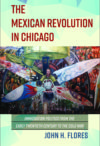
In The Mexican Revolution in Chicago: Immigration Politics from the Early Twentieth Century to the Cold War, John H. Flores illustrates the growth of the Mexican population in 1920s Chicago and how migrant communities situated and organized themselves politically in an often-hostile social environment. Drawing from political experiences in Mexico, Flores identifies and explores the evolution of a Mexican population whose identities and loyalties were shaped and divided by the Mexican revolutionary and counterrevolutionary processes in la patria (the homeland). | more…

Victor Grossman’s A Socialist Defector: From Harvard to Karl-Marx-Allee is at once an exciting adventure story, an engaging autobiography of a radical opponent of U.S. imperialism, and a clear-headed assessment of the successes and failures of the German Democratic Republic (GDR, East Germany) at the onset of the Cold War until 1990, when its citizens voted to merge with the Federal Republic of Germany (FRG, West Germany). Most poignantly, Grossman compares the benefits workers gained in the GDR, the FRG, and even the United States during the Cold War. | more…

From the mid-1960s to the late 2000s, the number of people locked in U.S. prisons and jails, and forced onto parole or probation, increased from less than eight hundred thousand to more than seven million. From the beginning, this explosive growth, known commonly as mass incarceration, has been about containing, stigmatizing, and exploiting the poorest sectors of the working class. While an important prison reform movement has been underway for many years, private forces have attempted to co-opt this movement and have implemented and profited from alternative forms of mass coercion proliferating throughout society. | more…

An interview with Henryk Szlajfer by Grzegorz Konat. Szlajfer was a leading figure in the student uprisings in Poland in March 1968. He was expelled from the University of Warsaw and was arrested and imprisoned for political dissent. He later conducted research in political economy focusing on the theory of monopoly capitalism, where he made major contributions, and coedited The Faltering Economy with John Bellamy Foster. | more…
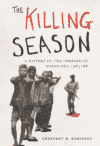
In The Killing Season: A History of the Indonesian Massacres, 1965–66, Geoffrey B. Robinson offers the most comprehensive history of Indonesia’s mass killings to date, arguing that the army, foreign governments, and monopoly capital must all be jettisoned from the country’s ruling coalition for meaningful justice to be achieved. | more…
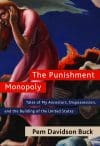
Why, asks Pem Davidson Buck, is punishment so central to the functioning of the United States, a country proclaiming “liberty and justice for all”? The Punishment Monopoly challenges our everyday understanding of American history, focusing on the constructions of race, class, and gender upon which the United States was built, and which still support racial capitalism and the carceral state. After all, Buck writes, “a state, to be a state, has to punish … bottom line, that is what a state and the force it controls is for.” | more…
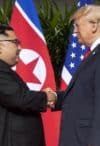
Ever since the United States divided the Korean peninsula in 1945, North Korea has had to cope with the existential challenge of U.S. hostility. Korea marks the western boundary of the empire, a border area where the sea power of the United States adjoins the land power of Russia and China. North Korea has been able to utilize this liminality to create a sovereign stateÑthe Democratic People’s Republic of KoreaÑwhose independence is not welcomed by either Moscow or Beijing but tolerated because the alternatives, a client of the other or absorption into the U.S. empire, are considered worse. Washington, as global hegemon, has been less willing to tolerate this independence but has faced constraints. The result has been a policy of hostility, of unrelenting diplomatic and economic war of varying intensity, stopping short of actual kinetic war, though never far from it. | more…

Marge Piercy is the author of many books of poetry, most recently Made in Detroit. | more…

In Bill Fletcher Jr.’s first novel, The Man Who Fell from the Sky, the sleepy Cape Cod town of Osterville has blood on its hands. In this murder mystery, Fletcher digs through layers of racism in Southern Massachusetts to uncover more than the killer’s identity. The novel compellingly exposes the racism of society, turning its victims against each other. | more…
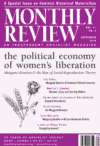
This special issue of Monthly Review honors the fiftieth anniversary this month of Margaret Benston’s landmark “The Political Economy of Women’s Liberation.” The essay sparked a revolution in Marxian thought, the full implications of which are only now being perceived in contemporary social reproduction theory. We have reprinted Benson’s pieces together with contributions by Silvia Federici, Martha E. Gimenez, Selma James (interviewed by Ron Augustin), Leith Mullings, Marge Piercy, and Lise Vogel, all of whom have played leading roles since the 1970s in the development of feminist historical materialism. | more…

In 1952, Selma James wrote the classic pamphlet A Woman’s Place and, in 1972, she and Mariarosa Dalla Costa published their groundbreaking The Power of Women and the Subversion of the Community, which discussed how women’s unpaid housework and care work is crucial to the production of the working class and, thus, the economy as a whole, launching the domestic labor debate inside the women’s movement. That same year, the International Wages for Housework Campaign was formed. In an interview with Ron Augustin at her home in London, James spoke of her political activities and years with C. L. R. James, whom she was with for more than twenty-five years, each with their own political activities but also sharing important struggles. | more…